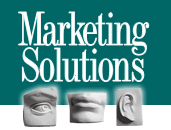
Profile Your Clients
Did you ever consider that the most important component of your marketing message has nothing to do with you or your service? It has very little to do with the solutions you provide. In fact, it's not even your uniqueness that grabs the attention of your prospects.
No, the most important component, the thing that gets the quickest attention and interest, is letting your prospect know that your service is designed exclusively for THEM.
When I'm giving talks or leading workshops on creating a marketing message, I've noticed something that happens time after time. I talk about the importance of targeting your audience and I ask a participant to articulate whom their services are for. She'll say something like: "I offer services for left handed people whom...." And invariably, all of the left-handed-people in the workshop ask for her card!
And this is before they even know what she does!
Actually, the more potent formula is saying whom your service is for and what their problem or issue is. "I help left-handed people who are tired of living in a right-handed world." That kind of statement really connects. "That's for me," is the response you'll get from your target audience.
So it amazes me that many business owners do everything they can to remove any reference to a specific target market. They're afraid they will narrow the market too much. But in doing so, they eviscerate the impact of their marketing message completely.
If your marketing message isn't for someone, it's really for no one.
One of the most important marketing exercises you can undertake is to clearly profile your target audience. But you need to do it at a depth you haven't even considered before.
Start with basic demographics or external selectors. If you're offering services to an individual, write down the age, gender, geographic location, education, etc. If a company, the industry, size, geographic location, gross revenues etc.
The rest is psychographics. This is the internal workings, interests, problems, values, philosophy and motivations. Look at all of these in great depth and create a personality profile for your target:
- Interests - What do your clients think about? Where do they spend their time? How do they react to things? What's important to them? What fascinates or intrigues them?
- Problems - What's bugging them, annoying them, disturbing them, frustrating them? What are their aversions? What do they dislike? What do they fear?
- Values - What do they hold in high regard? Where do they put their time and their money? What are their politics? What do they take a stand about? What and whom do they admire?
- Philosophy - What is their attitude to life and business? How do they approach challenges? Are they optimistic and accepting or pessimistic and cynical?
- Motivations - What makes them take action? Do they move away from things or move towards them? When will they commit to something? When will they ignore advice or accept advice?
Your personality profile should read like an FBI dossier. Have you ever seen an FBI dossier? Neither have I, but I can assure you that it's more than a short list of bullet points!
It needs to be a collection of well-thought-out ideas that paint a picture in great depth. You want to write something that demonstrates that you know this target audience better than they know themselves.
It should be from two to four pages long. You'll know you're just starting after you've written a page or so and don't think there's anything left to add. Then dig deeper. Who are these people that need your services? Really, who are they?
If you do this well, you can then extract marketing messages that will really hit the mark. When you talk about whom your services are for, there will be real depth behind your words. You'll be able to explain in detail and your target audience will stand up and say, "That's me. You know me and understand me. I think you can also help me."
What are some of the things you can do to communicate to your target audience that you specialize in working with them?
- Include your target audience in your tag line. Notice mine below the logo: “Providing Strategic Advice to Entrepreneurs”. Just adapt it to your audience. For instance: "Sales Training for the Non-Sales Person" or "Helping Technical Managers be Better Leaders."
- If you have a web site, feature a page that talks about whom you work with. Include information on your client profile, so that visitors to your site know you specialize in working with people or businesses just like them.
- Include several "problem scenarios" on this page as well. Let them know that you understand the issues and challenges that they are dealing with. "You may be frustrated by poor teamwork and productivity despite the fact that you've already done team building and training."
- Case studies are extremely effective because they talk about projects you've done with clients just like those in your target market. The natural response is, "Perhaps he can help me, just like he helped them."
- Challenge your target market. Let them know what they need to do to work with you and to succeed with you. "If you're committed to long-term success and not a quick fix, we're going to make great progress. We love to work with clients who want lasting change."
|


